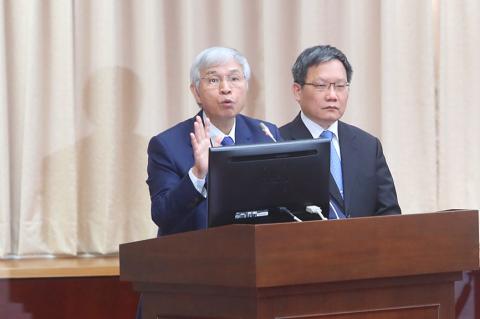The central bank yesterday kept policy rates unchanged for the 10th consecutive quarter, saying that a global economic slowdown and the US-China trade dispute merited a lenient policy.
The monetary policymaker trimmed its GDP growth forecast for this year to 2.68 percent from the 2.7 percent it predicted in September, and is anticipating a 2.33 percent pickup next year.
“The domestic stock rout has taken a toll on consumer spending, while economic weakness in major trading partners might dampen external demand,” central bank Governor Yang Chin-long (楊金龍) told a news conference after the bank’s quarterly board meeting.

Photo: CNA
Against this backdrop, the board unanimously agreed to hold the rediscount rate steady at 1.375 percent, the collateralized loan rate at 1.75 percent and the unsecured loan rate at 3.625 percent.
The downward GDP growth revision came after international research institutes cut forecasts for major economies and turned cautious, Yang said.
Taiwan, home to some of the world’s biggest electronic component suppliers, is susceptible to cyclical global technology corrections and effects of hostile tariff exchanges between Washington and Beijing, as such components account for more than half of all exports.
A conservative outlook led the bank to keep its target range for broad money supply next year unchanged at 2.5 percent to 6.5 percent, Yang said.
The bank expects consumer prices to increase 1.05 percent next year, while the consumer price index, a reliable long-term price tracker, would advance at a milder 0.93 percent, Yang said.
International oil prices have stabilized, easing imported inflationary pressures, the governor said, adding that stable consumer prices gave the bank room to adopt an accommodative monetary policy.
Yang declined to comment on policy rate changes next year, saying that the bank would base its decisions on the latest economic figures.
“Moves by other central banks will serve as a reference, but will not be the decisive factor,” he said.
Yang, who has a doctorate in economics, declined to comment on movements of the US dollar or capital flows, saying that most predictions have proved to be inaccurate.
He dismissed criticism that the bank failed to do anything to curb capital flight to pursue higher returns in US dollar-denominated assets following a series of rate hikes by the US Federal Reserve.
The capital outflows wreaked havoc on the local bourse, but also led to higher dividend payouts this year, Yang said.
Dividend payouts this year totaled NT$1.4 trillion (US$45.3 billion), up 11.8 percent from last year, with NT$460 billion wired overseas to foreign investors, the bank said.

SEMICONDUCTOR SERVICES: A company executive said that Taiwanese firms must think about how to participate in global supply chains and lift their competitiveness Taiwan Semiconductor Manufacturing Co (TSMC, 台積電) yesterday said it expects to launch its first multifunctional service center in Pingtung County in the middle of 2027, in a bid to foster a resilient high-tech facility construction ecosystem. TSMC broached the idea of creating a center two or three years ago when it started building new manufacturing capacity in the US and Japan, the company said. The center, dubbed an “ecosystem park,” would assist local manufacturing facility construction partners to upgrade their capabilities and secure more deals from other global chipmakers such as Intel Corp, Micron Technology Inc and Infineon Technologies AG, TSMC said. It

NO BREAKTHROUGH? More substantial ‘deliverables,’ such as tariff reductions, would likely be saved for a meeting between Trump and Xi later this year, a trade expert said China launched two probes targeting the US semiconductor sector on Saturday ahead of talks between the two nations in Spain this week on trade, national security and the ownership of social media platform TikTok. China’s Ministry of Commerce announced an anti-dumping investigation into certain analog integrated circuits (ICs) imported from the US. The investigation is to target some commodity interface ICs and gate driver ICs, which are commonly made by US companies such as Texas Instruments Inc and ON Semiconductor Corp. The ministry also announced an anti-discrimination probe into US measures against China’s chip sector. US measures such as export curbs and tariffs

The US on Friday penalized two Chinese firms that acquired US chipmaking equipment for China’s top chipmaker, Semiconductor Manufacturing International Corp (SMIC, 中芯國際), including them among 32 entities that were added to the US Department of Commerce’s restricted trade list, a US government posting showed. Twenty-three of the 32 are in China. GMC Semiconductor Technology (Wuxi) Co (吉姆西半導體科技) and Jicun Semiconductor Technology (Shanghai) Co (吉存半導體科技) were placed on the list, formally known as the Entity List, for acquiring equipment for SMIC Northern Integrated Circuit Manufacturing (Beijing) Corp (中芯北方積體電路) and Semiconductor Manufacturing International (Beijing) Corp (中芯北京), the US Federal Register posting said. The

India’s ban of online money-based games could drive addicts to unregulated apps and offshore platforms that pose new financial and social risks, fantasy-sports gaming experts say. Indian Prime Minister Narendra Modi’s government banned real-money online games late last month, citing financial losses and addiction, leading to a shutdown of many apps offering paid fantasy cricket, rummy and poker games. “Many will move to offshore platforms, because of the addictive nature — they will find alternate means to get that dopamine hit,” said Viren Hemrajani, a Mumbai-based fantasy cricket analyst. “It [also] leads to fraud and scams, because everything is now